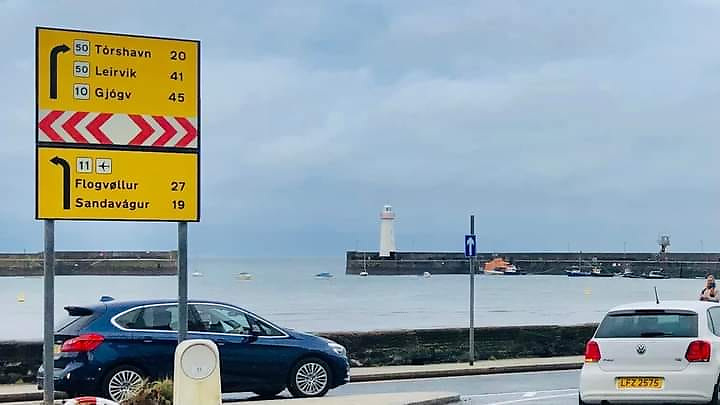When the Vikings first swept into Belfast Lough around 800 AD, the lack of harbours was no problem, as the gently shelving beach at the wide expanse of Ballyholme Bay was ideal for hauling their longships ashore. Thus Ballyholme – whose name suggests a mixture of Norse and Irish – provided the beginnings of a Viking stronghold which developed eastward through the little natural though drying harbour of Groomsport, and on down to what is now Donaghadee inside the Copeland Islands at the nearest point to Scotland.
In the twelve hundred or so years since, the area has seen dominant rulers and cultures come and go. But it seems that underneath the contemporary affluent appearance of what is now known as the Gold Coast, a little knot of the determined Viking spirit has endured in Donaghadee, and there appears to have been a quiet but very tangible revolution recently.
 The fishing port of Klaksvik is the heart of football enthusiasm in the Faroes. Cruising the islands can be a challenge. Although the tides go up and down very little, the tidal streams can roar through channels and past headlands like torrents, with boat-wrecking tide races resulting. As for the wind, it seldom blows steadily and horizontally, but goes up and down, with vertical gusts hitting the sea like gunfire
The fishing port of Klaksvik is the heart of football enthusiasm in the Faroes. Cruising the islands can be a challenge. Although the tides go up and down very little, the tidal streams can roar through channels and past headlands like torrents, with boat-wrecking tide races resulting. As for the wind, it seldom blows steadily and horizontally, but goes up and down, with vertical gusts hitting the sea like gunfire
For, just the other day, the good people of The ’Dee woke up to find that the street signs round their harbour had suddenly been changed to indicate that they are now part of the Faroe Islands, and thereby Danish in international terms.
FULMARS FOR LUNCH
Already, we’re assured that havestur, the favoured delicacy of Faroese cuisine, will be on the menu at the highly-regarded harbourside eateries. It’s an acquired taste – it’s marinated fulmar. But if you’re peckish enough - as in absolutely starving - you’ll manage it.
Also planned are several variations in the preparation of whale meat, as the most dedicated Faroese citizens-in-the-making in Donaghadee are determined that they will replicate the islands’ controversial grindadrap, the annual mass slaughter of pilot whales and dolphins.
BLOOD-LADEN AFFAIR
This is a blood-laden affair that the true-blue Faroese see as a non-negotiable part of their culture and heritage. The Donaghadee Faroese plan is to replicate it by temporarily sealing off one end of Donaghadee Sound inside the great Copeland Island, and then herding shoals of amiable whales towards it with typical northern industrial vigour.
 Fun for all the family….the annual Grindadrap is seen as a non-negotiable part of Faroese heritage
Fun for all the family….the annual Grindadrap is seen as a non-negotiable part of Faroese heritage
Another challenge will be found in mastering the art of being a “Strong Farmer”, Faroese style. A Faroese Strong Farmer is the man or woman who has best mastered the art of lowering a sheep down the vertiginous cliffs to some ledge of otherwise inaccessible luscious grass and then – more importantly – getting the fattened sheep back up again. For Donaghadee, it is thought that training in this can best be done with some modifications to the artificial rock-climbing wall in the nearest Leisure Centre, but local abandoned quarries are also being considered.
 Being a sheep farmer in the Faroes involves skills not taught at your usual Agricultural College
Being a sheep farmer in the Faroes involves skills not taught at your usual Agricultural College
FOOTBALL LINKS
The final piece in the Donaghadee-Into-The-Faroes project is the addition of Donaghadee soccer players into the deservedly famous Faroese team. The word is that a renowned small-but-perfectly-formed Donaghadee citizen of widely-communicated football interests has been approached with a view to taking up semi-permanent residence in the Faroese football heartland around the fishing port of Klaksvig. The feeling is that any crowd-funding project towards this personal re-location would be very generously supported.
As for the change’s sailing implications, it would mean that the many boats berthed in Bangor Marina would have the option of “going foreign” after a voyage of only six miles, and this might confer Duty Free benefits in storing up beforehand. So in all, Donaghadee-in-the-Faroes seems like a very good idea.































































